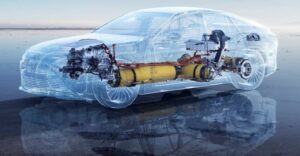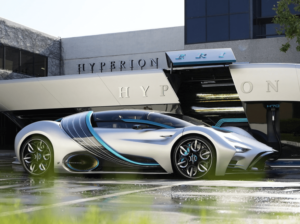 This year (2023) a new
This year (2023) a new battery hydrogen electric vehicle will be produced that has a 1,000 mile range and over 2,000 horsepower. Which begs the question: are FCEVs (hydrogen fuel cell electric vehicles) the future of EVs?
As a former Tesla owner, I have a lot of respect for BEVs (battery electric vehicles). Tesla disrupted the automotive industry to the point where Ford lost $1B last quarter trying to catch up. Maybe their money was better spent on the post-BEV rush?
I’ve owned gas engine vehicles ranging from 2 cylinders to 10. For the past two years I enjoyed the benefits of an EV. While I loved my Tesla Model 3 Performance, I ultimately went back to a pickup truck, but this time a hybrid truck. A Ford Maverick hybrid electric vehicle (HEV) is now my daily driver, adding the hybrid experience to my long list of owned and test-driven vehicles.
Having experienced a BEV and now an HEV, I’ve been able to form an opinion of both types of vehicles. What my opinions are, good and bad, I’ll save that post for another time. Now that I’ve personally witnessed the benefits and downsides to an all-electric vehicle and a partially-electric vehicle, it’s allowed me to truly see the potential in hydrogen-powered vehicles.
Unless you’re a car guy or happen to stumble upon something viral posted to social media, you probably aren’t seeing what’s going on these days when it comes to FCEVs. It has the potential to disrupt Tesla and the BEV movement. I’m not talking about hydrogen combustion engines, but rather fuel cell technology. To keep it simple, swap out your EV’s batteries for a much lighter hydrogen tank. You have motors at the wheels like an EV and the same instant power because, after all, it’s a full EV. It just uses a different type of fuel.
These days the most recognizable vehicle you’ve seen on the road powered by hydrogen is most likely for public transportation, a bus. That’s because the only two cars available are the Toyota Mirai and the Hyundai Nexo. Using the Mirai as an example, it costs about as much per mile as a gas engine vehicle, and getting to a refueling station is way more scarce than an electric charging station. A quick check here in San Diego, shows that as of May 29th of this year there are now only two, with three more planned. California is planning to have 100 filling stations by 2025. So, you think finding a charging station is difficult? Avoid hydrogen vehicles for the moment, depending on where you’re located and where you travel (especially outside of California).
So you may ask yourself, why bother with the current crop of hydrogen fuel cell electric vehicles? The typical car buyer wouldn’t. But it seems like newer hydrogen technologies might change this in the future.
The 1,000 Mile, 2,000 Horsepower Hydrogen Car
 A prototype vehicle called the XP1 from Hyperion claims their FCEV exceeds 1,000 mile range and 2,000 horsepower. And, they’re planning to roll out their own Tesla-style hydrogen refueling station network that is capable of refueling both hydrogen FCEVs and BEVs. Hopefully they can figure out a better way (production costs and costs to the environment) to produce the hydrogen at scale.
A prototype vehicle called the XP1 from Hyperion claims their FCEV exceeds 1,000 mile range and 2,000 horsepower. And, they’re planning to roll out their own Tesla-style hydrogen refueling station network that is capable of refueling both hydrogen FCEVs and BEVs. Hopefully they can figure out a better way (production costs and costs to the environment) to produce the hydrogen at scale.
It doesn’t take a rocket scientist to see the benefits to a hydrogen-powered vehicle over batteries. Here are a few:
- Faster refueling: Like gas, 3-5 minutes compared to 15-25 at a supercharging station (or hours if at home).
- Longer range: based on recent prototypes, 2-3 times that of an EV.
- Lighter weight: batteries are damn heavy. They handle like a normal gas car.
- Hydrogen not affected by extreme cold or heat temperatures (unlike batteries).
- Battery degradation: batteries degrade over time. FCEVs have none to degrade.
All those advantages seem overwhelming in favor of hydrogen over batteries. But here’s a list of challenges hydrogen car manufacturers need to overcome:
- Refueling network: Only 2 here in San Diego, a big city. They’re scarce. Most cities have none.
- Environmental: Producing, transporting, and storing hydrogen can be energy-intensive. Plus producing hydrogen can contribute to carbon emissions (unless carbon capture technology is used).
- Cost: More expensive to manufacture and maintain compared to electric batteries.
I realize that’s quite a mixed bag of pros and cons. But here’s where the disruption that Tesla had over the automotive industry could happen again. But this time, from a company like Hyperion. Honestly, whether it’s Hyperion that can get their act together or a different company, I don’t really care. My point is that while there are advancements in BEV tech all the time, you can’t ignore the advancements with FCEVs.
Let’s take a look at what the Hyperion XP1 supercar prototype is promoting:
- All-electric vehicle (powered by hydrogen)
- 1,016 mile range
- 2,038 horsepower
- 0-60 mph in 2.25 seconds
- Top speed: 221 mph
- Million mile life engine
- All-wheel drive
- NASA space technology
This thing is absolutely nutsoballs. It looks alien. It’s a bonafide hyper-car and is priced like one. It has some Bugatti DNA but its designers made it unique to Hyperion. I am not going to even get into the details about its 100-inch touchscreen, wing doors, chassis, carbon fiber/titanium hybrid panels, crazy pivoting solar wings, or sounds. My point is not about the vehicle, but rather the technology it brings.
Hyperion is a hydrogen and technology company first, car company second. They will only produce 300 total vehicles, beginning in 2023. The XP1 highlights its innovations and was created for marketing an awareness. I’d say they knocked it out of the park. The CEO of Hyperion Motors (based in Ohio), Angelo Kafantaris, explains this best:
The Hydrogen Automotive Industry in 2023
Hydrogen is used to power massive vehicles, such as NASA rockets into space. Batteries aren’t. It is used to power other large vehicles like buses, commercial trucks, and more. Not to say that battery tech won’t catch up one day, but I personally feel like hydrogen technology is at a better starting place than stacking a ton of batteries together and making them work in a car.
I have nothing to do with Hyperion. I just think what they’re doing is revolutionary and if executed correctly, has the power to disrupt the recently-disrupted automotive industry once again. Just about every auto maker has experimented with producing hydrogen vehicles, either as a prototype or as a production model. The fact that at this point there are only two production FCEVs on the market right now speaks volumes, but new hydrogen powered fuel cell vehicles are on the way in addition to the Hyperion XP1:
- Ford E-Transit hydrogen under 3 year trial announced May 2023
- BMW iX5 hydrogen vehicle announced February 2023
- Honda CR-V FCEV announced November 2022
- Toyota Hilux Hydrogen pickup truck prototype
- Land Rover Defender FCEV prototype
- Alpine A4810 Supercar concept
- Honda to produce new hydrogen fuel system co-developed with GM announced February 2023
- Stellantis ramping up FCEV production announced October 2022
To further confuse the industry acronyms such as BEV, HEV, PHEV, FCEV, etc. there are now hybrid vehicles coming out which combine batteries along with hydrogen. I believe at this point they’re still called HEVs? H2X is producing the “Warrego” FCEV hybrid (with battery) pickup truck in Australia this year. Renault is working on 2024 “Scenic Vision” hydrogen/battery hybrid.
It will be interesting to see if hydrogen FCEV tech is able to mature and become a viable solution for mainstream vehicle buyers. Is Hyperion the next Tesla? Is Angelo the next Elon? This is going to be interesting. Maybe the advancements in battery tech will prevail. Or maybe some other alien form of propulsion will be invented (found?). I’m still holding out for the flux capacitor. I don’t need to go faster than 88 mph anyway!
I’d love to hear your thoughts, below. Chime in!
Discover more from Chris Duke
Subscribe to get the latest posts sent to your email.

ROBERT GINSBERG
Jan 16, 2024 (1:18 am)
This is a great idea & ive talked about this for awhile now. Sensible but we need all price ranges to get all levels of income on board.